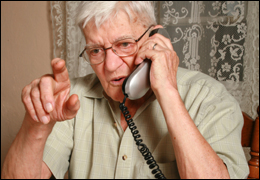One Ohio California
These sad stories were just the tip of the iceberg in the 1990s, when telemarketing fraud was in its criminal heyday, mostly preying on the elderly and ringing up an estimated $40 billion in losses from the pockets of American consumers.
But the FBI and its partners fought back during the decade through a series of major investigations that put a sizeable dent in the operations of telemarketing hucksters.
One of the most important of these cases was publicly unveiled 15 years ago yesterday—on December 7, 1995 . Dubbed Operation Senior Sentinel, it was as novel as it was successful. Successful, because it ultimately resulted in some 1,200 arrests and hundreds of convictions across the nation. And novel, because for the first time, it put victims themselves in an undercover role to help current and retired FBI agents catch fraudsters.
That case was a spin-off of two earlier major investigations led by the FBI that targeted telemarketing “boiler rooms”—so named because they typically involve a crowded room full of sales persons using high-pressure, often illegal sales tactics on unsuspecting victims over the phone. The first investigation—Operation Disconnect—began in 1991 in Salt Lake City, expanding nationwide and culminating in a wave of 240 arrests in March 1993. The second, called Operation Sunstroke because it was based in Miami
At the time, the FBI office in Miami San Diego
In Senior Sentinel, we added yet another effective investigative twist and a first in law enforcement. In addition to tapping into retired agents, we asked citizen volunteers recruited by the AARP—the American Association of Retired Persons—to aid the investigation by acting as victims. These individuals (some of whom actually were victims) were trained by Bureau agents, who secretly recorded the conversations. The tapes were then forwarded to our office in San Diego
These three cases—along with Operation Double Barrel in 1998 and others that followed—have had a lasting impact in reducing the scourge of telemarketing fraud.
San Diego Special Agent in Charge Keith Slotter, who helped launch Operation Sunstroke while an agent in Miami
The message remains: the FBI is committed to taking down bogus telemarketers, now and in the future.
Senior Sentinel Scams
The following were the most common types of scams in Operation Senior Sentinel. Some of these tactics are still used today—see our tips on avoiding telemarketing fraud.
- Charity Room: Telemarketers asked for money for a charity. In reality, less than 10 percent of the funds went to the charity.
- Prize Room: Callers were told they had won a prize, but needed to send a fee or purchase another product in order to collect their winnings.
- Product Room: A product purchased during a telemarketing pitch was worth less than claimed, had an added cost when delivered, or was never delivered at all.
- Recovery Room: Previous fraud victims were told they could recover their money by paying an upfront fee.









No comments:
Post a Comment